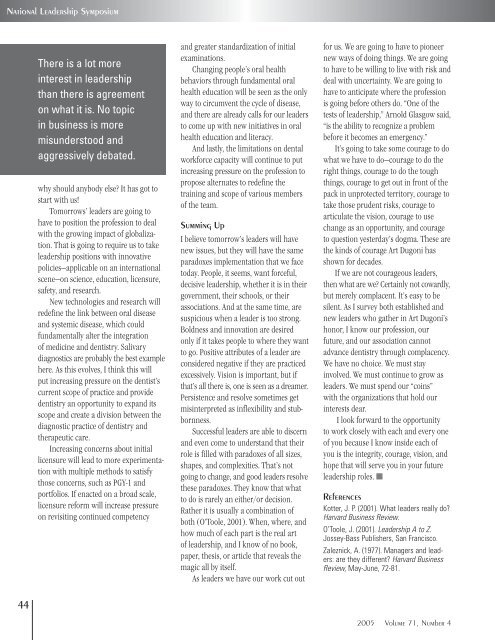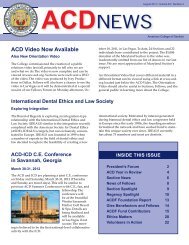JACD 71-4 - American College of Dentists
JACD 71-4 - American College of Dentists
JACD 71-4 - American College of Dentists
- No tags were found...
You also want an ePaper? Increase the reach of your titles
YUMPU automatically turns print PDFs into web optimized ePapers that Google loves.
National Leadership Symposium<br />
44<br />
There is a lot more<br />
interest in leadership<br />
than there is agreement<br />
on what it is. No topic<br />
in business is more<br />
misunderstood and<br />
aggressively debated.<br />
why should anybody else? It has got to<br />
start with us!<br />
Tomorrows’ leaders are going to<br />
have to position the pr<strong>of</strong>ession to deal<br />
with the growing impact <strong>of</strong> globalization.<br />
That is going to require us to take<br />
leadership positions with innovative<br />
policies—applicable on an international<br />
scene—on science, education, licensure,<br />
safety, and research.<br />
New technologies and research will<br />
redefine the link between oral disease<br />
and systemic disease, which could<br />
fundamentally alter the integration<br />
<strong>of</strong> medicine and dentistry. Salivary<br />
diagnostics are probably the best example<br />
here. As this evolves, I think this will<br />
put increasing pressure on the dentist’s<br />
current scope <strong>of</strong> practice and provide<br />
dentistry an opportunity to expand its<br />
scope and create a division between the<br />
diagnostic practice <strong>of</strong> dentistry and<br />
therapeutic care.<br />
Increasing concerns about initial<br />
licensure will lead to more experimentation<br />
with multiple methods to satisfy<br />
those concerns, such as PGY-1 and<br />
portfolios. If enacted on a broad scale,<br />
licensure reform will increase pressure<br />
on revisiting continued competency<br />
and greater standardization <strong>of</strong> initial<br />
examinations.<br />
Changing people’s oral health<br />
behaviors through fundamental oral<br />
health education will be seen as the only<br />
way to circumvent the cycle <strong>of</strong> disease,<br />
and there are already calls for our leaders<br />
to come up with new initiatives in oral<br />
health education and literacy.<br />
And lastly, the limitations on dental<br />
workforce capacity will continue to put<br />
increasing pressure on the pr<strong>of</strong>ession to<br />
propose alternates to redefine the<br />
training and scope <strong>of</strong> various members<br />
<strong>of</strong> the team.<br />
Summing Up<br />
I believe tomorrow’s leaders will have<br />
new issues, but they will have the same<br />
paradoxes implementation that we face<br />
today. People, it seems, want forceful,<br />
decisive leadership, whether it is in their<br />
government, their schools, or their<br />
associations. And at the same time, are<br />
suspicious when a leader is too strong.<br />
Boldness and innovation are desired<br />
only if it takes people to where they want<br />
to go. Positive attributes <strong>of</strong> a leader are<br />
considered negative if they are practiced<br />
excessively. Vision is important, but if<br />
that’s all there is, one is seen as a dreamer.<br />
Persistence and resolve sometimes get<br />
misinterpreted as inflexibility and stubbornness.<br />
Successful leaders are able to discern<br />
and even come to understand that their<br />
role is filled with paradoxes <strong>of</strong> all sizes,<br />
shapes, and complexities. That’s not<br />
going to change, and good leaders resolve<br />
these paradoxes. They know that what<br />
to do is rarely an either/or decision.<br />
Rather it is usually a combination <strong>of</strong><br />
both (O’Toole, 2001). When, where, and<br />
how much <strong>of</strong> each part is the real art<br />
<strong>of</strong> leadership, and I know <strong>of</strong> no book,<br />
paper, thesis, or article that reveals the<br />
magic all by itself.<br />
As leaders we have our work cut out<br />
for us. We are going to have to pioneer<br />
new ways <strong>of</strong> doing things. We are going<br />
to have to be willing to live with risk and<br />
deal with uncertainty. We are going to<br />
have to anticipate where the pr<strong>of</strong>ession<br />
is going before others do. “One <strong>of</strong> the<br />
tests <strong>of</strong> leadership,” Arnold Glasgow said,<br />
“is the ability to recognize a problem<br />
before it becomes an emergency.”<br />
It’s going to take some courage to do<br />
what we have to do—courage to do the<br />
right things, courage to do the tough<br />
things, courage to get out in front <strong>of</strong> the<br />
pack in unprotected territory, courage to<br />
take those prudent risks, courage to<br />
articulate the vision, courage to use<br />
change as an opportunity, and courage<br />
to question yesterday’s dogma. These are<br />
the kinds <strong>of</strong> courage Art Dugoni has<br />
shown for decades.<br />
If we are not courageous leaders,<br />
then what are we? Certainly not cowardly,<br />
but merely complacent. It’s easy to be<br />
silent. As I survey both established and<br />
new leaders who gather in Art Dugoni’s<br />
honor, I know our pr<strong>of</strong>ession, our<br />
future, and our association cannot<br />
advance dentistry through complacency.<br />
We have no choice. We must stay<br />
involved. We must continue to grow as<br />
leaders. We must spend our “coins”<br />
with the organizations that hold our<br />
interests dear.<br />
I look forward to the opportunity<br />
to work closely with each and every one<br />
<strong>of</strong> you because I know inside each <strong>of</strong><br />
you is the integrity, courage, vision, and<br />
hope that will serve you in your future<br />
leadership roles. ■<br />
References<br />
Kotter, J. P. (2001). What leaders really do?<br />
Harvard Business Review.<br />
O’Toole, J. (2001). Leadership A to Z.<br />
Jossey-Bass Publishers, San Francisco.<br />
Zaleznick, A. (1977). Managers and leaders:<br />
are they different? Harvard Business<br />
Review, May-June, 72-81.<br />
2005 Volume <strong>71</strong>, Number 4





